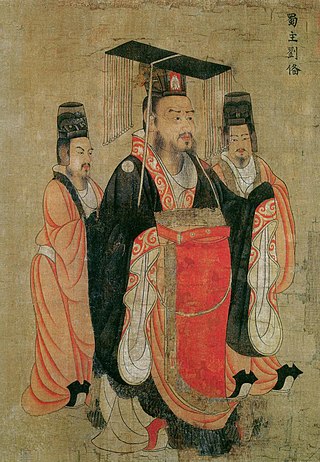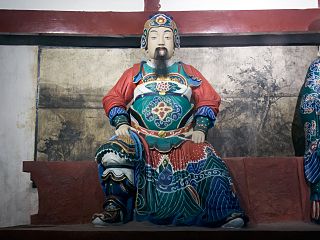
The Battle of Xiaoting (猇亭之戰),also known as the Battle of Yiling and the Battle of Yiling and Xiaoting,was fought between the state of Shu and the state of Wu,between the years 221 and 222 in the early Three Kingdoms period of China. The battle is significant because Wu was able to turn the situation from a series of initial losses into a defensive stalemate,before proceeding to win a decisive victory over Shu. The Wu victory halted the Shu invasion and preceded the death of Liu Bei,Shu's founding emperor.

Liu Bei,courtesy name Xuande (玄德),was a Chinese warlord in the late Eastern Han dynasty who later became the founding emperor of Shu Han,one of the Three Kingdoms of China. Although he was a distant relative of the Han imperial family,Liu Bei's father died when he was a child and left his family impoverished. To help his mother,he sold shoes and straw mats. When he reached the age of fifteen,his mother sent him to study under Lu Zhi. In his youth,Liu Bei was known as ambitious and charismatic. He gathered a militia army to fight the Yellow Turbans. Liu Bei fought bravely in many battles and grew famous for his exploits. Later,he participated in the coalition against Dong Zhuo,following this joined his childhood friend Gongsun Zan and fought under him against Yuan Shao.

Zhang Fei,courtesy name Yide,was a military general serving under the warlord Liu Bei in the late Eastern Han dynasty and early Three Kingdoms period of China. Zhang Fei and Guan Yu,who were among the earliest to join Liu Bei,shared a brotherly relationship with their lord and accompanied him on most of his early exploits. Zhang Fei fought in various battles on Liu Bei's side,including the Red Cliffs campaign (208–209),takeover of Yi Province (212–214),and Hanzhong Campaign (217–218). He was assassinated by his subordinates in 221 after serving for only a few months in the state of Shu Han,which was founded by Liu Bei earlier that year.

Shamoke was a tribal chieftain who lived in Wuling Commandery in the late Eastern Han dynasty and Three Kingdoms period of China. He allied with the Shu Han state during the Battle of Xiaoting of 221–222 against the Eastern Wu state and was killed in battle.
Li Yan,courtesy name Zhengfang,also known as Li Ping,was a military general of the state of Shu Han during the Three Kingdoms period of China. He climbed to the zenith of his career when he was asked by the Shu emperor Liu Bei to be the military paramountcy and co-regent alongside Zhuge Liang for his son and successor,Liu Shan. After the death of Liu Bei,Li Yan was given the rank of General of the Vanguard which was last held by Guan Yu back in 220. Li served most of his career in the mid and late 220s as the area commander for the Eastern Front centered in Yong An with Chen Dao as his deputy;he never faced any major battles in his position. However,during the 230s and the 4th of Zhuge Liang's Northern Expeditions,Li Yan was given a higher rank of General of the Agile Cavalry,below only Zhuge Liang. He was assigned to handle logistics,but he was unable to deliver supplies to Zhuge Liang's army in a timely manner. After his attempt to fraudulently cover his inability to follow commands,Li Yan was stripped from positions and power.
Huang Quan,courtesy name Gongheng,was a military general of the state of Cao Wei during the Three Kingdoms period of China. He previously served under the warlords Liu Zhang and Liu Bei during the late Eastern Han dynasty and in the state of Shu Han during the early Three Kingdoms period before defecting to Cao Wei. Liu Bei relied heavily on Huang Quan for counsel in both domestic and foreign policy. Under the Wei government,however,Huang Quan was restricted to only internal affairs because even though the Wei emperor Cao Pi appreciated him for his talent,he doubted Huang Quan's allegiance and believed he was still secretly loyal to Liu Bei.
Li Hui,courtesy name De'ang,was an official of the state of Shu Han during the Three Kingdoms period of China. After refusing Liu Zhang's service,Li joined Liu Bei early in his campaign to pacify Yi province. After Liu Bei's death,Li Hui proved his talents during Zhuge Liang's Southern Campaign and was appointed the area commander in the south. He set the standard for his successors,such as Ma Zhong,for sound governance. After Shu-Han's co-regent Li Yan was removed from office,Li Hui was promoted again and sent to Hanzhong to assist in the Northern Expeditions but died a year later.

Deng Zhi,courtesy name Bomiao,was a government official,diplomat and military general of the state of Shu Han during the Three Kingdoms period of China. A descendant of Deng Yu,Deng Zhi started his career in the late Eastern Han dynasty under the warlord Liu Bei as a low-level officer in Pi County. After Liu Bei discovered his talent,Deng Zhi steadily rose through the ranks to become a county prefect and later a commandery administrator and imperial secretary. In 223,the Shu regent Zhuge Liang sent him as Shu's envoy to meet Sun Quan,the ruler of Shu's ally state Wu,and reestablish the Wu–Shu alliance against their common rival state Wei. Deng Zhi succeeded in his mission and earned praise from Sun Quan for strengthening Wu–Shu ties. In 227,Deng Zhi became a military general and he participated in the first Shu invasion of Wei by leading a decoy force with Zhao Yun to distract the Wei general Cao Zhen. Although they lost the battle,Deng Zhi and Zhao Yun managed to rally their troops to put up a firm defence during their retreat and minimise their losses. Following Zhuge Liang's death in 234,Deng Zhi rose to higher general ranks and was stationed in present-day Chongqing for about 10 years before he was recalled back to the Shu capital Chengdu in his 70s to serve as General of Chariots and Cavalry. In 248,he suppressed a rebellion in Fuling. He died in 251.
Wu Ban,courtesy name Yuanxiong,was a Chinese military general of the state of Shu Han in the Three Kingdoms period of China.
Quan Cong,courtesy name Zihuang,was a Chinese military general of the state of Eastern Wu during the Three Kingdoms period of China. Born in present-day Hangzhou towards the end of the Eastern Han dynasty,Quan Cong became famous at a young age when he performed acts of charity by giving grain to people suffering from famine and providing shelter to refugees from central China. He started his career under the warlord Sun Quan as a military officer and achieved success in his early career by pacifying the restive Shanyue tribes in the Jiangdong territories. After Sun Quan became an independent ruler of Wu in 222,Quan Cong rose to the rank of General and participated in battles against Wu's rival state Wei. He also pacified rebellions by local tribes in Danyang,Wu and Kuaiji commanderies. After Sun Quan became emperor in 229,Quan Cong married his daughter Sun Luban and became one of his most trusted generals. During this time,although he was less active in battles,he became more outspoken on state affairs. He strongly objected to Sun Quan's decision to let his heir apparent Sun Deng lead troops into battle because it was against traditions,and attempted to dissuade Sun Quan from launching an invasion of Zhuya and Yizhou. Towards the end of his life,he became embroiled in a power struggle between Sun Quan's sons Sun He and Sun Ba over the succession to their father's throne. Although he supported Sun Ba,he died before he could see the power struggle end in 250 with neither Sun He nor Sun Ba becoming the new heir apparent. Throughout his life,Quan Cong was known for being a respectful and agreeable man who remained humble despite his high social status and prestige. As a military commander,he was known for being courageous and decisive,and for conducting himself with dignity and often taking the bigger picture into consideration.
Pan Zhang,courtesy name Wengui,was a military general serving under the warlord Sun Quan during the late Eastern Han dynasty of China. He continued serving in the state of Eastern Wu during the Three Kingdoms period until his death. Pan Zhang was praised by Chen Shou as one of the "twelve tiger minister of Jiangdong" (江東十二虎臣).
Luo Xian,courtesy name Lingze,was a military general of Shu Han in the Three Kingdoms period of China. After the fall of Shu in 263,he continued serving under the Cao Wei state,then the succeeding Jin dynasty in 266. He is best known for defending his position at Yong'an for about six months against attacks from Shu's former ally state Wu after the fall of Shu.
Bu Zhi,courtesy name Zishan,was a Chinese military general and politician of the state of Eastern Wu during the Three Kingdoms period of China. Originally a scholar of humble background,he became a subordinate of the warlord Sun Quan in the late Eastern Han dynasty and gradually rose through the ranks. Between 210 and 220,he served as the governor of the remote and restive Jiao Province in southern China. During the Battle of Xiaoting/Yiling of 221–222,he quelled local uprisings in Sun Quan's territories in southern Jing Province and maintained peace in the area. After Sun Quan became emperor in 229,Bu Zhi oversaw the Wu armed forces guarding the Wu–Shu border at Xiling for about 20 years. During this time,he also gave advice to Sun Quan's first heir apparent,Sun Deng,and spoke up for officials affected by LüYi's abuses of power. In 246,he became the fourth Imperial Chancellor of Wu,but died in office in the following year.
Liu Bei's takeover of Yi Province was a military campaign by the warlord Liu Bei in taking control of Yi Province from the provincial governor,Liu Zhang. The campaign took place between the years 211 and 214 in the late Eastern Han dynasty;although the conflict between Liu Bei and Liu Zhang started in January or February 213 when the latter discovered the former secret communications and subsequently executed Zhang Song. It concluded with victory for Liu Bei and his successful takeover of the province from Liu Zhang in July 214. Yi Province would serve as the foundation of the state of Shu Han during the Three Kingdoms period.
The following is the order of battle for the Battle of Red Cliffs.
This article contains the family trees of members of the Sun clan,who ruled the state of Eastern Wu (229–280),in the Three Kingdoms period (220–280),in China.

Zhang Nan,courtesy name Wenjin (文進),was a military officer of the state of Shu Han in the Three Kingdoms period of China.
Sun Luyu,courtesy name Xiaohu,was an imperial princess of the state of Eastern Wu during the Three Kingdoms period of China. She was the younger daughter of Sun Quan,the founding emperor of Wu,and his concubine Bu Lianshi. She is also referred to as Princess Zhu (朱公主/朱主) because of her marriage to Zhu Ju.
Sun Luban,courtesy name Dahu,was an imperial princess of the state of Eastern Wu during the Three Kingdoms period of China. She was the elder daughter of Sun Quan,the founding emperor of Wu,and his concubine Bu Lianshi. She is also a grand princess (長公主) a title given to the emperor's favorite daughter,and was also Princess Quan (全公主/全主) because of her marriage to Quan Cong.
Yang Xi,courtesy name Wenran,was an official of the state of Shu Han during the Three Kingdoms period of China. He is best known for writing the Ji Han Fuchen Zan,a collection of praises of notable persons who served in the Shu Han state. Chen Shou,the third-century historian who wrote the Records of the Three Kingdoms (Sanguozhi),extensively quoted and annotated Yang Xi's collection.






